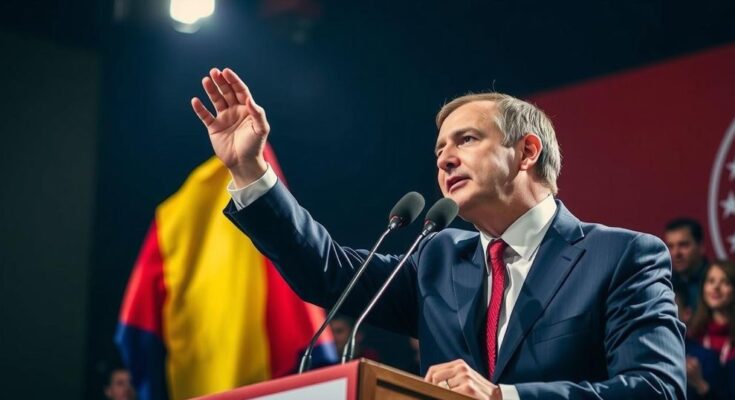Calin Georgescu, a hard-right populist, has surprisingly taken the lead in Romania’s presidential election with nearly 23 percent of the votes. He is poised to face Prime Minister Marcel Ciolacu in a run-off on December 8. Georgescu’s anti-EU and NATO views present a significant challenge to Romania’s pro-Western orientation, evidenced by former public support for Ukraine amid its ongoing conflict with Russia.
In a surprising turn of events, the Romanian presidential election has witnessed hard-right populist Calin Georgescu emerging as a formidable contender. With nearly 23 percent of the votes counted, he narrowly leads over Prime Minister Marcel Ciolacu, who has secured approximately 20 percent. This outcome raises significant concerns about Romania’s pro-European stance, as Georgescu advocates for positions strongly opposing the European Union and NATO.
Georgescu, aged 62, has transitioned from a relatively obscure figure to a political frontrunner, having garnered only 5 percent in prior polls. His campaign, predominantly conducted through platforms like TikTok, contrasts sharply with traditional candidates such as Ciolacu, who had been expected to lead. Third place is held by Elena Lasconi of the Save Romania Union party with nearly 19 percent, while George Simion of the far-right Alliance for the Unity of Romanians follows closely with 14 percent.
The upcoming run-off is set for December 8 and marks a critical juncture in Romania’s political landscape, especially given Georgescu’s controversial positions on various issues. He has previously called for a cessation of aid to Ukraine amidst its conflict with Russia and has vocalized disdain for NATO’s military presence in Romania. In discussing his electoral success, Georgescu emphasized the electorate’s demand for “peace,” interpreting the election results as a public affirmation of his agenda. As a NATO and EU member nation, Romania’s endorsement of Georgescu could drastically reshape its geopolitical alignment.
Bucharest’s prior commitment to support Ukraine, including military assistance and strategic training initiatives, now faces scrutiny, considering Georgescu’s stance against continued support of Kyiv. The outcome of the election will remain a pivotal point of interest for both Eastern European politics and international relations, particularly in the context of ongoing conflicts in the region.
The Romanian presidential election has illuminated a significant shift in the political climate of the country, with rising support for hard-right populist figures who challenge the existing pro-European framework. In this context, NATO and EU memberships are being reconsidered by parts of the electorate, particularly amid growing concerns surrounding regional conflict and national sovereignty. Calin Georgescu’s campaign has resonated with voters through a blend of social media outreach and contentious stances on foreign policy, promoting skepticism regarding traditional alliances and support for neighboring Ukraine.
In summary, Calin Georgescu’s unexpected lead in the Romanian presidential election signals a potential shift away from the country’s historically pro-Western policies. As his run-off against Prime Minister Marcel Ciolacu approaches, the implications of this election are profound, particularly concerning Romania’s role within NATO and its support for Ukraine. This development not only reflects changing voter sentiments but also raises questions about the future trajectory of Romanian foreign policy.
Original Source: www.aljazeera.com




